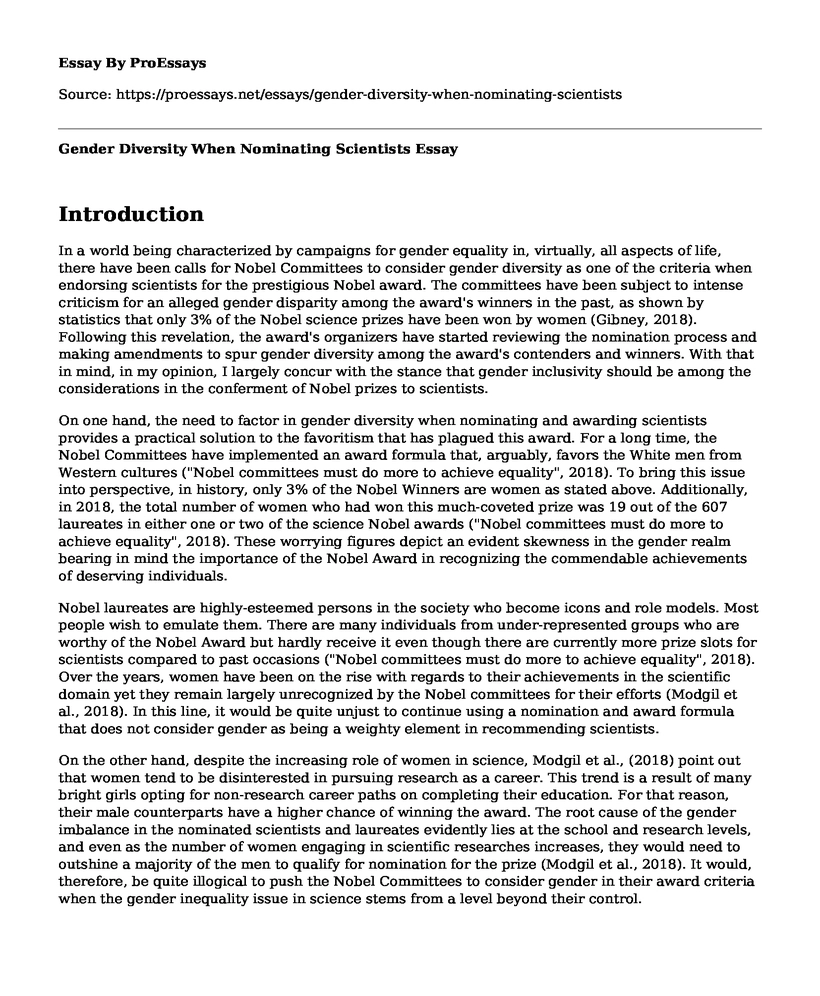Introduction
In a world being characterized by campaigns for gender equality in, virtually, all aspects of life, there have been calls for Nobel Committees to consider gender diversity as one of the criteria when endorsing scientists for the prestigious Nobel award. The committees have been subject to intense criticism for an alleged gender disparity among the award's winners in the past, as shown by statistics that only 3% of the Nobel science prizes have been won by women (Gibney, 2018). Following this revelation, the award's organizers have started reviewing the nomination process and making amendments to spur gender diversity among the award's contenders and winners. With that in mind, in my opinion, I largely concur with the stance that gender inclusivity should be among the considerations in the conferment of Nobel prizes to scientists.
On one hand, the need to factor in gender diversity when nominating and awarding scientists provides a practical solution to the favoritism that has plagued this award. For a long time, the Nobel Committees have implemented an award formula that, arguably, favors the White men from Western cultures ("Nobel committees must do more to achieve equality", 2018). To bring this issue into perspective, in history, only 3% of the Nobel Winners are women as stated above. Additionally, in 2018, the total number of women who had won this much-coveted prize was 19 out of the 607 laureates in either one or two of the science Nobel awards ("Nobel committees must do more to achieve equality", 2018). These worrying figures depict an evident skewness in the gender realm bearing in mind the importance of the Nobel Award in recognizing the commendable achievements of deserving individuals.
Nobel laureates are highly-esteemed persons in the society who become icons and role models. Most people wish to emulate them. There are many individuals from under-represented groups who are worthy of the Nobel Award but hardly receive it even though there are currently more prize slots for scientists compared to past occasions ("Nobel committees must do more to achieve equality", 2018). Over the years, women have been on the rise with regards to their achievements in the scientific domain yet they remain largely unrecognized by the Nobel committees for their efforts (Modgil et al., 2018). In this line, it would be quite unjust to continue using a nomination and award formula that does not consider gender as being a weighty element in recommending scientists.
On the other hand, despite the increasing role of women in science, Modgil et al., (2018) point out that women tend to be disinterested in pursuing research as a career. This trend is a result of many bright girls opting for non-research career paths on completing their education. For that reason, their male counterparts have a higher chance of winning the award. The root cause of the gender imbalance in the nominated scientists and laureates evidently lies at the school and research levels, and even as the number of women engaging in scientific researches increases, they would need to outshine a majority of the men to qualify for nomination for the prize (Modgil et al., 2018). It would, therefore, be quite illogical to push the Nobel Committees to consider gender in their award criteria when the gender inequality issue in science stems from a level beyond their control.
Conclusion
All in all, with the above two views in mind, I believe that even though work quality and merit are the main yardsticks for recommending scientists and awarding them, gender diversity presents another key aspect for the committees to deliberate on if the much talked about imbalance is to be resolved. As the number of female scientists increases, they deserve recognition for their efforts and accomplishments, which can only be achieved by implementing an even selection and conferment standard where gender is a vital determinant.
References
Gibney, E. (2018). What the Nobels are - and aren't - doing to encourage diversity. Retrieved from https://www.nature.com/articles/d41586-018-06879-z
Modgil, S., Gill, R., Sharma, V. L., Velassery, S., & Anand, A. (2018). Nobel Nominations in Science: Constraints of the Fairer Sex. Annals of Neurosciences, 25(2), 63-79.
Nobel committees must do more to achieve equality. (2018). Retrieved from https://www.nature.com/articles/d41586-018-06951-8
Cite this page
Gender Diversity When Nominating Scientists. (2022, Nov 25). Retrieved from https://proessays.net/essays/gender-diversity-when-nominating-scientists
If you are the original author of this essay and no longer wish to have it published on the ProEssays website, please click below to request its removal:
- Constructivist Theory - Article Analysis Example
- The Current Rhetorical Ecology About Migration in the Houston Essay
- The Role of Latent Heat While Phases Are Changing Paper Example
- Essay Example on Social Activism: Taking Action for Essential Causes in Society
- Paper Example on How to Create a Math Course for Millennial
- Essay on Gaining Global Understanding as a Step to Becoming a Conservator
- Free Essay Sample on Culture Shock







